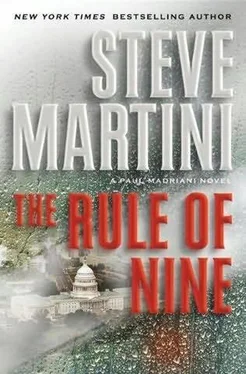“So you guys are doing Mexican tonight, is that it?” I ask.
Jenny glances at Sarah and smiles. “And then I thought we’d go to a place downtown.”
“A club?” I ask.
“Yeah. Place called Ivy. They have good music.”
“Listen, you guys have a good time,” I tell them. We all head toward the door.
“I’ll be home by two.” Sarah kisses me on the cheek. “Don’t wait up.”
“You have your key?” I ask.
“Got it, Dad. And don’t worry. We’ll talk more tomorrow,” she says as they head to the car.
“Good night. Have fun.” I stand outside under the porch light watching as Jen’s Camry slides down the driveway and backs into the street. A few seconds later the taillights fade into the distance and disappear down the block.
He sat in a rickety ladder-back chair that wobbled and teetered just a little each time he leaned forward to type.
The room was small and dark. It resembled a closet more than an office. A single naked lightbulb hung from a wire dangling from the ceiling, just above his wispy strands of unkempt gray hair. The shiny crown at the back of his balding head gleamed with illumination, revealing only a subtle hint of the energy and purpose that blazed within.
The Old Weatherman could almost feel the political ground shifting beneath his feet as he pounded the letters on the computer’s keyboard. Outside, turbulent public attitudes turned like a weathervane in a cyclone. It was a sign of the times, a measure of people’s fears and their uncertainty about what lay ahead.
The window of opportunity was already beginning to close. He had only months for the entire train of events to play out. The doctors had told him that he would be dead by then. The cancer was already in his lungs and brain. No matter. He had time. He would set in motion the change that would take America into the future, a transformation of the system that no politician or political party could ever bring about; he would “breach the monastery.”
Back in the late sixties and early seventies, when they were young and stupid, they set off isolated bombs in federal buildings and courthouses around the country. Such a waste. None of it had any effect except to give Nixon the excuse to crack down on all forms of dissent. Other than to cause some localized terror and largely regional headlines, their actions failed entirely to bring about their ultimate goal, a permanent change to the system. One that would take the country in an entirely new direction, away from the corporations and the capitalist underpinnings that had taken America down the wrong path since its inception.
Then, in 2001, foreign terrorists struck the World Trade Center. Flying commercial jets loaded with fuel and passengers into the twin towers, they killed more than three thousand people. They also hit the Pentagon, causing hundreds more to die. And what was the effect? Did they bring down the country? No. Did they destroy the U.S. economy? No, at least not immediately.
Economic markets recovered in less than a year and came raging back to hit peaks never before seen. The damage to the Pentagon was repaired in a few months and the U.S. military set about to crush two of the regimes thought to be most antagonistic to American interests.
As he clicked on the keys, the Old Weatherman thought about his old comrade, Senator Joshua Root. He had voted for the war along with the rest of them. Back in his day, when he was young, Root used a different name. He didn’t call himself Josh to pander to voters. No, back then he was spouting a different rhetoric, the words of revolution-power to the people, throwing rocks and Molotov cocktails. That was before he saw the error of his ways and sold out.
The Old Weatherman wondered if Root had ever seen him coming, or if the good senator had been completely blindsided by the first e-mail message. Of course, like himself, Root had a number of private e-mail accounts where he hid out in dark corners, places where government censors, auditors, and investigators could not see his personal musings and sins. The Old Weatherman had found them all. Even if Root closed one, the Old Weatherman could go to another. It was because the Old Weatherman had an inside connection, someone Root could never get rid of.
People like Root never expected to be held accountable for anything. Their sense of privilege and entitlement blinded them. And, of course, Root couldn’t go to the police and tell them that he was being blackmailed. The truth would destroy him.
The Old Weatherman stopped the pounding of the keys for a moment and thought about it. It had to be the work of the gods, all of it. It was too perfect.
The attack on the World Trade Center accomplished something that no one realized at the time. What became a series of protracted and unpopular wars distracted many in Washington, particularly in the White House, from the real danger. A rapidly expanding bubble of false fortunes and speculation in the nation’s housing market was threatening to take the country where it hadn’t been in more than seventy years, into the grip of another Great Depression.
When the bubble burst on the eve of the national election, it came with such swiftness and public shock that the country was left reeling. Overnight the reactionary forces in the White House and Congress were swept from power in a way that hadn’t been seen almost since the Civil War. It was something that no one could have predicted even a month before.
When all the dust had settled, the Old Weatherman sat back and pondered the stunning political landscape that lay before him. For the first time in modern American history, all of the stars were aligned, the set pieces in place. He couldn’t believe his eyes. A young, liberal president, some called him radical, was installed in the White House. His party controlled both houses of Congress with majorities that could not be overridden or stalled.
For at least the next two years, until the midterm elections, they had a free hand. It was the perfect storm and the Old Weatherman was about to add the coup de grâce. While Congress and the White House argued over health care and taxes, unemployment and trade, a new subterranean agenda of change would be moving on a parallel course, one that the powers in Washington could never anticipate.
The system was now vulnerable to true endemic change on an order that had not been seen since the founding of the country, change that, if successful, and if done soon, would alter the direction of America for the next hundred years.
The house had a dangling For Sale sign planted in the dead grass of the front lawn. A large old elm tree near the sidewalk provided shade, so he pulled up to the curb and parked. Even the words “For Sale” hung vertically from a partially broken chain. It appeared that the place was deserted, nobody there who might get nosy and come out and see what Liquida was doing.
He knew it could take hours. For Liquida it was an act of amusement on its way to becoming a labor of love.
For the man they called “the Mexicutioner,” pursuing a vendetta was a high art form. It was not something to be hurried or rushed.
He knew there was a limit to the level of physical pain a human body could endure. Liquida had often tested this boundary, looking for new horizons. But at some point the brain’s natural defenses always seemed to kick in and the object of his attentions would lose consciousness. He was able to revive the barbecued Arab three times while probing all of his nerve endings with an arc welder and tongs before the guy finally latched on to the only sedative that Liquida had never been able to reverse-death.
This might be okay for some of his guests, but not for the lawyer. For him there was no amount of physical pain sufficient to quench Liquida’s thirst for revenge.
Читать дальше












